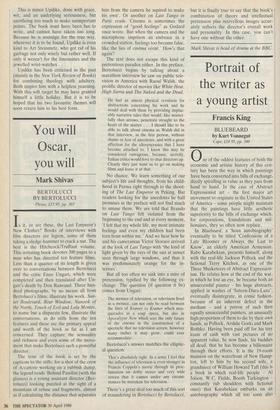You will Oscar, you will
Mark Shivas
BERTOLUCCI BY BERTOLUCCI
Plexus, £15.95, pp. 303
Is it, or are these, the Last Emperor's New Clothes? Books of interviews with film directors are legion, some of them taking a sledge-hammer to crack a nut. The best is the Hitchcock/Truffaut volume. This irritating book devotes 300 pages to a man who has directed ten feature films. Less than a quarter of its length is given over to conversations between Bertolucci and the critic Enzo Ungari, which were completed and then translated after Un- gari's death by Don Ranvaud. Three hun- dred photographs, by no means all from Bertolucci's films, illustrate his work. Sun- set Boulevard, Rear Window, Nanook of the North, Touch of Evil and Lola Montes, to name but a disparate few, illustrate the conversations, as do stills from the ten features and these are the primary appeal and worth of the book as far as I am concerned. They capture the sensuality and richness and even some of the move- ment that make Bertolucci such a powerful director.
The tone of the book is set by the captions to the stills; for a shot of the crew of Accattone working on a rubbish dump, the legend reads 'Behind Pasolini (with the glasses) is a young assistant director (Ber- tolucci) looking puzzled at the sight of a mountain of refuse and fragments, almost as if calculating the distance that separates him from the camera he aspired to make his own'. Or another on Last Tango in Paris reads 'Cinema is sometimes the expression of "good feelings" as Godard once wrote. But when the camera and the microphone imprison an embrace in a crowded station, feelings too become false, like the lies of cinema verite.' How's that again?
The text does not escape this kind of pretentious paradox either. In the preface, Bertolucci begins by talking about a marathon interview he saw on public tele- vision in America with Raoul Walsh, the prolific director of movies like White Heat, High Sierra and The Naked and the Dead.
He had an almost physical revulsion for abstractions concerning his work and he would deal with them by providing implac- ably narrative tales that would, like master- fully shot arrows, penetrate straight to the heart of the matter . . . I should like to be able to talk about cinema as Walsh did in that interview, in the first person, without shame or fear of anecdotes, and with a great affection for the idiosyncrasies that I have become attached to. I know this may be considered outrageous, because, secretly, Italian critics would love to shut directors up. Clearly they just want us to go on making films and leave it at that.
No chance. We learn something of our subject's life and thoughts, from his child- hood in Parma right through to the shoot- ing of The Last Emperor in Peking. But readers looking for the anecdotes he half promises in the preface will not find much to amuse them. We are told that Brando on Last Tango felt violated from the beginning to the end and at every moment, 'I felt that my whole life, my most intimate feelings and even my children had been torn from within me.' And we hear how he and his cameraman Victor Storaro arrived at the look of Last Tango with 'the kind of light given by the rays of the sun at sunset seen through large windows, and thus it was predominately orange for the in- teriors'.
But all too often we sink into a mire of pretension, typified by the following ex- change. The question (if question it be) comes from Ungari:
The menace of television, or television lived as a menace, can not only be read between the lines of Kramer vs Kramer which mas- querades as a soap opera, but also in Apocalypse Now which sees the only future of the cinema in the construction of a spectacle that no television screen, however many inches it may grow, could ever accommodate.
Bertolucci's answer matches the elliptic- al question:
That's absolutely right. In a sense I feel that the influence of television is even stronger in Francis Coppola's movie through its proc- lamation on dolby stereo and very wide screen that it cannot under any circum- stances be mistaken for television.
There's a great deal too much of this sort of maundering in Bertolucci by Bertolucci,
but it is finally true to say that the book's combination of theory and intellectual pretension plus marvellous images accur- ately reflects the director's overall work and personality. In this case, you can't have one without the other.
Mark Shivas is head of drama at the BBC.


























































 Previous page
Previous page